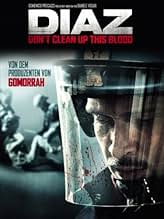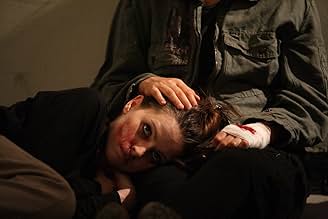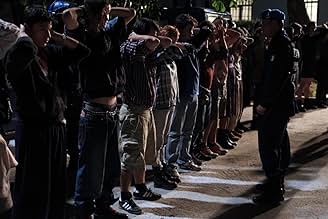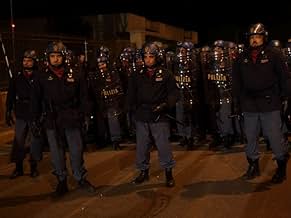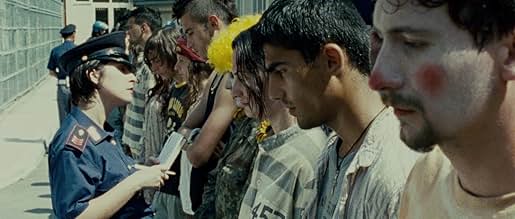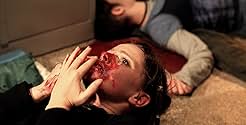VALUTAZIONE IMDb
7,3/10
4161
LA TUA VALUTAZIONE
Una rievocazione degli ultimi giorni del vertice del G8 del 2001.Una rievocazione degli ultimi giorni del vertice del G8 del 2001.Una rievocazione degli ultimi giorni del vertice del G8 del 2001.
- Regia
- Sceneggiatura
- Star
- Premi
- 15 vittorie e 23 candidature totali
Recensioni in evidenza
Let's make something perfectly clear before you watch this movie. If you didn't like the police before this movie, you won't for sure not like the police afterwards. The police is NOT your friend. They are the puppets of the people in power, and those people are corrupt to the bone. That's noting new, it's like that in almost every country. But to see that this happened in a "civilized" country like Italy is just repulsive and makes me sick to the stomach. Police brutality, it's not new, and it won't stop because of this movie. The proof, while I write this, is the current manifestations of the "Yellow Jackets" in France where we witness systematic daily police brutality, shooting flashballs in peoples faces, beating up everybody that stands in their way. The media trying to cover up all this police brutality are all on the payroll of the government. The independent media is the only one you can trust. And that's exactly what they show in this movie, extreme police violence and independent journalists trying to do their jobs. The movie is very hard to watch, and that's only if you have some feelings left when you witness injustice. Those right wing pigs should all be in prison, but the truth is that none of them even lost their job. Just like twenty years later where a Parisian cop gets the medal of honor after beating up innocents while on the other hand a citizen is in prison for beating up one of those robocops with his bare fists. A must watch if you want to try to understand how the police works if you're still living in a bubble on your cloud.
A KVIFF viewing, an Italian film from director Daniele Vicari, the film undertakes a sticky task to recount the fierce police assault on the so-called black-bloc group (mostly foreigners, students, journalists) after some protesters' affray in the final days of 2001 G8 Summit in Genova.
The film's chief characteristic is its visual language, shockingly bold and deadly savage, which inevitably will be shunned by the demography of those are intolerable of graphic violence. One must admit, we are now in the era where news generally fade away in a 48-hour rotation, there are myriads of mostly recent "unfortunate incidents" have been erased from our mind, so as to this film takes a quite extreme measurement to remind us such horrifying and atrocious events did actually exist only a decade ago in a developed western country, with government authorities holding the reins.
The very first scene, is a backward slow-motion of a protester slinging an empty bottle toward the police vehicles which are deliberately passing by the area, in order to procure a professed pretext to carry out the subsequent battery, so allegedly the entire action is ruthlessly plotted to set an example and to hector the masses. Two-thumbs up to the valor of the film, which fearlessly exposes the dark side of the government and the powerlessness of individual. But when the said slow-motion has been exploited multiple times, a dwindling impact inexorably occurs each time it recurs.
Due to the fact the approach of depicting this scandalizing event in a multi-reflective manner, it entails a wide range of characters, local volunteers, various foreigners (among those are many innocent victims and the real peace-breakers who ironically evade the brute force), policemen who execute the operation, The numerous cast diffuses one's concentration while most roles are underwritten and loosely connected or fragmented, nevertheless Jennifer Ulrich gives a gutsy impression as a victim traumatized both outside and inside, Claudio Santamaria, also stands out among the bulk of cast, as the righteous Italian policeman who is more of a reluctant witness than a government's henchman or heavy.
Anyway, with excellent editing, sound effects and a steady camera eye, the film is a quite mature work, on which one definitely could ruminate and alert oneself to be more conscious of the tragic happenings, they are just around us, be wise and be careful.
The film's chief characteristic is its visual language, shockingly bold and deadly savage, which inevitably will be shunned by the demography of those are intolerable of graphic violence. One must admit, we are now in the era where news generally fade away in a 48-hour rotation, there are myriads of mostly recent "unfortunate incidents" have been erased from our mind, so as to this film takes a quite extreme measurement to remind us such horrifying and atrocious events did actually exist only a decade ago in a developed western country, with government authorities holding the reins.
The very first scene, is a backward slow-motion of a protester slinging an empty bottle toward the police vehicles which are deliberately passing by the area, in order to procure a professed pretext to carry out the subsequent battery, so allegedly the entire action is ruthlessly plotted to set an example and to hector the masses. Two-thumbs up to the valor of the film, which fearlessly exposes the dark side of the government and the powerlessness of individual. But when the said slow-motion has been exploited multiple times, a dwindling impact inexorably occurs each time it recurs.
Due to the fact the approach of depicting this scandalizing event in a multi-reflective manner, it entails a wide range of characters, local volunteers, various foreigners (among those are many innocent victims and the real peace-breakers who ironically evade the brute force), policemen who execute the operation, The numerous cast diffuses one's concentration while most roles are underwritten and loosely connected or fragmented, nevertheless Jennifer Ulrich gives a gutsy impression as a victim traumatized both outside and inside, Claudio Santamaria, also stands out among the bulk of cast, as the righteous Italian policeman who is more of a reluctant witness than a government's henchman or heavy.
Anyway, with excellent editing, sound effects and a steady camera eye, the film is a quite mature work, on which one definitely could ruminate and alert oneself to be more conscious of the tragic happenings, they are just around us, be wise and be careful.
The film "Diaz – Don't clear up the blood" had its world premiere in Berlin, as part of the Berlinale 2012 film festival, in front of a full house with an estimated 1,750 viewers. The screening ended with an overwhelming applause, that lasted for an unusual long time. A considerable part of those involved in making this film was present. In his introduction the director mentioned that several victims of the raid were among them. He admired their preparedness to relive the dire event.
The film title has two parts. The first (Diaz) part refers to the name of the school where the raid took place. The police thinks it is a nest full of "black bloc", allegedly being the core of demonstrations around the G8 summit in 2001 in Genoa (Italy). The second (Don't clean...) part refers to a hand made sign that was written on the wall after the raid, actually asking to keep intact what was left behind. That included large blood stains all over floors and walls, very useful as indisputable contradictory statement against the police PR.
A clever scenario circles around what happened, rather than treating events chronologically. An important feature of the film is that we were introduced to miscellaneous persons having specific roles later on. This served as a binding element, elevating the film above a simple documentary. As the director said: due to these minor roles, you better remember the events afterwards. We see for example an elderly tourist, who got detached from his bus tour and was only looking for a place to sleep. Another example is a journalist from a right-wing magazine, taking leave to report from the inside out. Many more such personal stories develop along the line, working out exactly as the director mentioned.
We were also offered an impression how average policemen stand in this. The tone is set in a scene where we see how a police car gets lost in some neighborhood they better stay out. They are immediately surrounded by angry citizens calling them "murderers", the result of a recent event where one person was killed in the course of a demonstration. The policemen feel threatened but escape unharmed.
Also from a law enforcement viewpoint, but on a different level, we observe several decision makers (district attorney, police commanders, city council, etc). They had to depend on biased reports from police officers, finally deciding to proceed on very weak grounds, but "we must do something". Various evidence was planted to support their decision, or declared solid evidence later on. Benign empty bottles were allegedly stocked there for making Molotov cocktails. The PR aftermath from the police was evidently biased too, Best example were remarks about prepared wounds, said to have already existed before the raid, with express intent to blame the police later on. Of course, speaking of obvious bias is easy for us to say; we had ample chance to see the general picture from both sides.
The actual raid is visualized in full force, about halfway the two hours running time. What we see before and after this core scene, continuously circles around it by showing whereabouts of victims and bystanders, and how they got involved. All are clearly innocent of the bad things the police attributed to them. They all happened to be at the wrong place at the wrong time. These personal stories, however small and trivial in the context of what is happening, work very well to elevate this film above a dry documentary that only states facts.
I could not help wondering how useful it is to show the raid in every nasty detail. One important reason is that pictures speak one thousand words. We can expect the impact on the average viewer to be much greater than only words. A second reason could be that the film clearly shows the needlessly exaggerated amount of police power put into force, just for a relatively small unarmed group. A perfect illustration was the scene were everyone was standing with hands above their heads, apparently believing that an explicit show of being unarmed and defenseless would suffice, but the police bulldozed over them regardless.
We witnessed a meeting of city council and law enforcement decision makers, giving a clear insight how it could come that far. The proof that lefties (not my words) were gathering was very thin (long hair, hoodies, what further proof do we need?). Also noteworthy was a statement from the police commander that he would be unable to control his men once in action. After that we saw a rather sketchy briefing for the policemen in the field, merely amplifying already dormant feelings that Diaz housed very illegal, near-terrorist actions. After such a biased preparation the heavily visualized police brutality within Diaz becomes a bit more understandable. The instructions to the policemen conveyed an image of illegality, with adversaries determined to plan demonstrations and other unlawful actions.
Part of the final credits were some statistics about policemen and other officials convicted for involvement in the action. That is how "the system" works, but I'm certain it took years to come to final convictions. And above all, it leaves us with doubts whether it will improve future decision making. And last but not least, it won't repair the (internal and external) wounds of the victims having to live on with the consequences.
All in all, an impressive document about the raid, providing very useful insights in what happened before and after. The various personal stories bring it to a much higher level than just a documentary. Also very interesting is that we see both sides, and the mechanisms involved how things like this get out of control.
The film title has two parts. The first (Diaz) part refers to the name of the school where the raid took place. The police thinks it is a nest full of "black bloc", allegedly being the core of demonstrations around the G8 summit in 2001 in Genoa (Italy). The second (Don't clean...) part refers to a hand made sign that was written on the wall after the raid, actually asking to keep intact what was left behind. That included large blood stains all over floors and walls, very useful as indisputable contradictory statement against the police PR.
A clever scenario circles around what happened, rather than treating events chronologically. An important feature of the film is that we were introduced to miscellaneous persons having specific roles later on. This served as a binding element, elevating the film above a simple documentary. As the director said: due to these minor roles, you better remember the events afterwards. We see for example an elderly tourist, who got detached from his bus tour and was only looking for a place to sleep. Another example is a journalist from a right-wing magazine, taking leave to report from the inside out. Many more such personal stories develop along the line, working out exactly as the director mentioned.
We were also offered an impression how average policemen stand in this. The tone is set in a scene where we see how a police car gets lost in some neighborhood they better stay out. They are immediately surrounded by angry citizens calling them "murderers", the result of a recent event where one person was killed in the course of a demonstration. The policemen feel threatened but escape unharmed.
Also from a law enforcement viewpoint, but on a different level, we observe several decision makers (district attorney, police commanders, city council, etc). They had to depend on biased reports from police officers, finally deciding to proceed on very weak grounds, but "we must do something". Various evidence was planted to support their decision, or declared solid evidence later on. Benign empty bottles were allegedly stocked there for making Molotov cocktails. The PR aftermath from the police was evidently biased too, Best example were remarks about prepared wounds, said to have already existed before the raid, with express intent to blame the police later on. Of course, speaking of obvious bias is easy for us to say; we had ample chance to see the general picture from both sides.
The actual raid is visualized in full force, about halfway the two hours running time. What we see before and after this core scene, continuously circles around it by showing whereabouts of victims and bystanders, and how they got involved. All are clearly innocent of the bad things the police attributed to them. They all happened to be at the wrong place at the wrong time. These personal stories, however small and trivial in the context of what is happening, work very well to elevate this film above a dry documentary that only states facts.
I could not help wondering how useful it is to show the raid in every nasty detail. One important reason is that pictures speak one thousand words. We can expect the impact on the average viewer to be much greater than only words. A second reason could be that the film clearly shows the needlessly exaggerated amount of police power put into force, just for a relatively small unarmed group. A perfect illustration was the scene were everyone was standing with hands above their heads, apparently believing that an explicit show of being unarmed and defenseless would suffice, but the police bulldozed over them regardless.
We witnessed a meeting of city council and law enforcement decision makers, giving a clear insight how it could come that far. The proof that lefties (not my words) were gathering was very thin (long hair, hoodies, what further proof do we need?). Also noteworthy was a statement from the police commander that he would be unable to control his men once in action. After that we saw a rather sketchy briefing for the policemen in the field, merely amplifying already dormant feelings that Diaz housed very illegal, near-terrorist actions. After such a biased preparation the heavily visualized police brutality within Diaz becomes a bit more understandable. The instructions to the policemen conveyed an image of illegality, with adversaries determined to plan demonstrations and other unlawful actions.
Part of the final credits were some statistics about policemen and other officials convicted for involvement in the action. That is how "the system" works, but I'm certain it took years to come to final convictions. And above all, it leaves us with doubts whether it will improve future decision making. And last but not least, it won't repair the (internal and external) wounds of the victims having to live on with the consequences.
All in all, an impressive document about the raid, providing very useful insights in what happened before and after. The various personal stories bring it to a much higher level than just a documentary. Also very interesting is that we see both sides, and the mechanisms involved how things like this get out of control.
When you ever wished you had participated in a happy leftie mass event - watch that movie. The camera gave me the whole time the feeling of being part of the crowd on the screen, just there in the school building, between all the funny people - the guy who plays flamenco guitar, some Manu Chao song, the pop-up band, people just dancing - all of them who want to make the world a better place. A lot of languages are used all over the movie, people act like like real people do, it's just fine. This is the first part. Everything afterward, as we know, is of extreme brutality, and I was happy that I had never been part in that leftie mass event. I really liked the movie how it was make, technically. It's only a pity that a lot of answers are not given. It would have been helpful to work out more of the backgrounds. The extreme force of the police, where did it come from? There must have been a lot of hate and fear a long time in advance. We don't get to know much about the really violent left wing and how far the police was able or willing to make a difference between them and the average wild-haired, guitar-playing and further peaceful demonstrators. So, I missed some different points of view besides just the picture of peaceful lefties. But when you realize that everything really has happened like this, the the world is maybe less subtle some times. And that makes me shiver.
In Late April 2009, I got a call in London to come to Genova to meet several mystery guests who wanted to meet me and several of the other Diaz victims. I was coming anyway to see Dr Zucca (The Genova prosecutor) but I was intrigued to find out who the mystery guests were. I met Domenico Procacci and Daniele Vicari in Genova at the Via San Luca office (where the Diaz case is archived) in late May for a 'secret weekend meeting' after the Cannes Film Festival.
At the time, I did not know who Procacci and Vicari were but I was told they were the best film producer and director in Italy and they wanted to make a movie of the raid on Diaz during the G8. I had seen Gomorrah, Procacci's mafia film and thought it was brilliant. Using this film as a comparison, I listened to what Domenico wanted to say to all of us present. Procacci explained to us that he had wanted to make a multi-million euro film about the raid for a long time but had been prevented because the trial process against the police.
He was willing to risk a lot of money on the project and we could all see that Domenico and Daniele were committed to making the movie. I personally told them that whilst I had a lot of personal confidence, I thought the Diaz police would try and stop the project or the right ring politicians like Berlusconi or Fini my sue Fandango. I also told them that Diaz is still live court case and that they had to do a lot of research.
After all of us from Diaz consulted with each other, we gave Domenico Procacci and Daniele Vicari permission to make the film. All of us were taking a risk allowing a production company like fandango access to the video evidence & photos and documents involved in the trial. However, we all felt that the story of the raid and what we had lived through had to be told to the rest of the world.
What is unusual about the Diaz movie was that there was no script in existence, so Fandango commissioned Laura Paolucci to spend two years writing a script. The end result is a pulp fiction style film which is 80% true to the story of Diaz. Obviously, Vicari could not go into detail about the entire G8 which forms the backdrop for the beginning of the film but I think Vicari has done an almost perfect job of marrying together true events with a few high drama fictional characters.
I think the combination of powerful high impact footage, recreated scenes and the chance of lifting the lift on the inside of the anti-globalization movement makes Diaz the movie a special film. The 2001 G8 was the biggest and worst riot in Europe in 60 years. To complete the film, Vicari has combined the usual high quality style of Italian film screening to capture this important moment of history, making it one of the best, most talked about and most controversial films to come out of Italy in 20 years.
Only after the film had premiered in Berlin did I learn that Procacci had said that Diaz had been his most challenging and complicated film to make with Vicari in agreement.
My story is played by an Italian actor Pietro Ragusa and my almost death is one of the penultimate scenes in the movie. Because I ran out of Diaz, I took the full force of Canterini's unit, the 7th Mobile heavy riot unit that had specially trained for the Genova G8 summit. Pietro's part is almost as it exactly happened and I am very happy despite the scene is one of the most harrowing.
At the time, I did not know who Procacci and Vicari were but I was told they were the best film producer and director in Italy and they wanted to make a movie of the raid on Diaz during the G8. I had seen Gomorrah, Procacci's mafia film and thought it was brilliant. Using this film as a comparison, I listened to what Domenico wanted to say to all of us present. Procacci explained to us that he had wanted to make a multi-million euro film about the raid for a long time but had been prevented because the trial process against the police.
He was willing to risk a lot of money on the project and we could all see that Domenico and Daniele were committed to making the movie. I personally told them that whilst I had a lot of personal confidence, I thought the Diaz police would try and stop the project or the right ring politicians like Berlusconi or Fini my sue Fandango. I also told them that Diaz is still live court case and that they had to do a lot of research.
After all of us from Diaz consulted with each other, we gave Domenico Procacci and Daniele Vicari permission to make the film. All of us were taking a risk allowing a production company like fandango access to the video evidence & photos and documents involved in the trial. However, we all felt that the story of the raid and what we had lived through had to be told to the rest of the world.
What is unusual about the Diaz movie was that there was no script in existence, so Fandango commissioned Laura Paolucci to spend two years writing a script. The end result is a pulp fiction style film which is 80% true to the story of Diaz. Obviously, Vicari could not go into detail about the entire G8 which forms the backdrop for the beginning of the film but I think Vicari has done an almost perfect job of marrying together true events with a few high drama fictional characters.
I think the combination of powerful high impact footage, recreated scenes and the chance of lifting the lift on the inside of the anti-globalization movement makes Diaz the movie a special film. The 2001 G8 was the biggest and worst riot in Europe in 60 years. To complete the film, Vicari has combined the usual high quality style of Italian film screening to capture this important moment of history, making it one of the best, most talked about and most controversial films to come out of Italy in 20 years.
Only after the film had premiered in Berlin did I learn that Procacci had said that Diaz had been his most challenging and complicated film to make with Vicari in agreement.
My story is played by an Italian actor Pietro Ragusa and my almost death is one of the penultimate scenes in the movie. Because I ran out of Diaz, I took the full force of Canterini's unit, the 7th Mobile heavy riot unit that had specially trained for the Genova G8 summit. Pietro's part is almost as it exactly happened and I am very happy despite the scene is one of the most harrowing.
Lo sapevi?
- QuizDirector Daniele Vicari watched 700 hours of video footage for research.
- Colonne sonoreEvolution, Revolution, Love
Performed by Tricky
I più visti
Accedi per valutare e creare un elenco di titoli salvati per ottenere consigli personalizzati
- How long is Diaz - Don't Clean Up This Blood?Powered by Alexa
Dettagli
- Data di uscita
- Paesi di origine
- Sito ufficiale
- Lingue
- Celebre anche come
- Diaz
- Luoghi delle riprese
- Aziende produttrici
- Vedi altri crediti dell’azienda su IMDbPro
Botteghino
- Budget
- 6.453.637 € (previsto)
- Lordo in tutto il mondo
- 2.621.201 USD
- Tempo di esecuzione
- 2h 7min(127 min)
- Colore
- Proporzioni
- 2.35 : 1
Contribuisci a questa pagina
Suggerisci una modifica o aggiungi i contenuti mancanti

